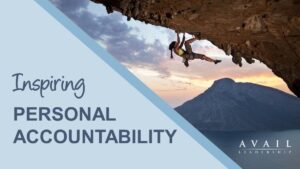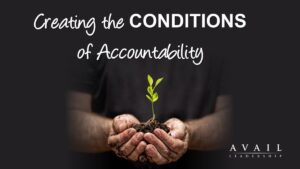Excellence is built on a foundation of accountability. When accountability is the norm, people feel safe to take ownership of problems, they cooperate instead of pointing fingers, and they find sustainable solutions that make the whole organization smarter. It begins with changing senior managers’ behavior. Learn how.
Changing behavior starts with learning a better way to solve your problems. These workshops teach managers the few, highest impact leadership behaviors that empower excellence.

Inspiring Personal Accountability sheds some light on the cultural forces at play that are hurting organizational results. This initial workshop focuses on the steps managers at all levels can take to personally model the behaviour they want to see in others.
Participants will learn:

Building Accountable Relationships identifies the most important habits people must develop to ensure their important relationships are producing the desired benefits for both parties and teaches participants how to help others be accountable in a positive and supportive way.
 Accountability is about taking ownership of results and working to improve future results. Managers often become frustrated, however, when the people to whom they delegate work don’t produce the results the manager had in mind. This leads many managers to conclude: “If you want something done right, do it yourself.” This attitude kills accountability because it encourages managers to micromanage, discourages employees from learning and taking initiative, and drastically reduces organizational capacity.
Delegation & Empowerment shows managers how to set people up for success rather than “throw them in the deep end and see if they sink or swim.” When managers set employees up for success, everybody wins.
Accountability is about taking ownership of results and working to improve future results. Managers often become frustrated, however, when the people to whom they delegate work don’t produce the results the manager had in mind. This leads many managers to conclude: “If you want something done right, do it yourself.” This attitude kills accountability because it encourages managers to micromanage, discourages employees from learning and taking initiative, and drastically reduces organizational capacity.
Delegation & Empowerment shows managers how to set people up for success rather than “throw them in the deep end and see if they sink or swim.” When managers set employees up for success, everybody wins.
 Managers tend to believe that being accountable is a trait you either have or don’t have by the time you enter the workforce. In other words, “It’s the person.” Is it possible, however, that it could also be the environment? Could managers be unwittingly creating conditions that make it harder for employees to be accountable?
Creating the Conditions of Accountability uncovers the organizational beliefs and practices that may be producing undesirable results and create a safe space to address them. Participants will learn how they can create the conditions of accountability to flourish in their organization.
This workshop is designed for senior managers only as they will be brainstorming strategic initiatives they will need to implement.
Managers tend to believe that being accountable is a trait you either have or don’t have by the time you enter the workforce. In other words, “It’s the person.” Is it possible, however, that it could also be the environment? Could managers be unwittingly creating conditions that make it harder for employees to be accountable?
Creating the Conditions of Accountability uncovers the organizational beliefs and practices that may be producing undesirable results and create a safe space to address them. Participants will learn how they can create the conditions of accountability to flourish in their organization.
This workshop is designed for senior managers only as they will be brainstorming strategic initiatives they will need to implement.
Knowing is not doing. The workshops equip managers with new methods and tools, but managers need help applying what they learned.
Resources
Michael Timms
Michael Timms is a best-selling author and sought-after speaker and consultant who teaches leaders how to inspire greatness in those they lead. Michael offers a wide range of leadership services and resources through his company Avail Leadership Inc.
© Copyright Avail Leadership 2022